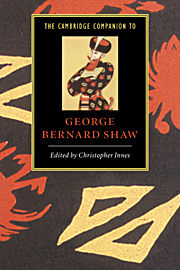Book contents
- Frontmatter
- Part 1 The social and cultural context
- Part 2 Shaw the dramatist
- 5 Shaw's early plays
- 6 Shavian comedy and the shadow of Wilde
- 7 Structure and philosophy in Man and Superman and Major Barbara
- 8 “Nothing but talk, talk, talk - Shaw talk”
- 9 The roads to Heartbreak House
- 10 Reinventing the history play
- 11 Shaw's interstices of empire
- 12 The later Shaw
- Part 3 Theatre work and influence
- Index
10 - Reinventing the history play
Caesar and Cleopatra, Saint Joan, "In Good King Charles's Golden Days"
from Part 2 - Shaw the dramatist
Published online by Cambridge University Press: 28 May 2006
- Frontmatter
- Part 1 The social and cultural context
- Part 2 Shaw the dramatist
- 5 Shaw's early plays
- 6 Shavian comedy and the shadow of Wilde
- 7 Structure and philosophy in Man and Superman and Major Barbara
- 8 “Nothing but talk, talk, talk - Shaw talk”
- 9 The roads to Heartbreak House
- 10 Reinventing the history play
- 11 Shaw's interstices of empire
- 12 The later Shaw
- Part 3 Theatre work and influence
- Index
Summary
Defining the history play
When the Players arrive at Elsinore, Polonius details the genres and subgenres of the Elizabethan theatre in which they excel: “tragedy, comedy, history, pastoral, pastoral-comical, historical-pastoral, tragical-historical, tragical-comical-historical-pastoral, scene individable, or poem unlimited” (Hamlet, II.ii). The joke makes clear that even at the time when histories were enjoying their greatest popularity, as Herbert Lindenberger puts it, “the boundaries between historical drama and recognizable genres such as tragedy and romance are often quite fluid.” Defining historical drama in the age of Shakespeare, Irving Ribner draws a distinction between plays in which the playwright “assumes the function of the historian,” and “romantic drama using historical figures” with “no attempt to accomplish the serious purpose of the historian.” What Ribner sees as the distinguishing feature of the Elizabethan history play Shaw singles out as his own special claim: Shaw, too, insists that he is a serious historian and that such dramas as Caesar and Cleopatra, Saint Joan, and “In Good King Charles's Golden Days” must be evaluated as contributions to historical knowledge. At the same time, Shaw, with characteristic playfulness, suggests that attention to detail, one “serious purpose of the historian,” is of little interest to him: “I never worry myself about historical details until the play is done; human nature is very much the same always and everywhere,” he told Clarence Rook. “Given Caesar, and a certain set of circumstances, I know what would happen, and when I have finished the play you will find I have written history.” Shaw's claim to find a higher historical truth than that found by pedants worrying the details draws its force from a long tradition of rivalry between historians and playwrights that characterizes discussion of historical drama ever since Shakespeare.
- Type
- Chapter
- Information
- The Cambridge Companion to George Bernard Shaw , pp. 195 - 217Publisher: Cambridge University PressPrint publication year: 1998
- 2
- Cited by



